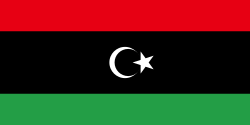| ||
Early general elections were held in Libya on 8 May 1965 to elect members of the House of Representatives, the lower house of Parliament, [1] following the dissolution of parliament by King Idris after the 1964 elections. [2] As political parties were banned, all candidates ran as independents. In order to ensure the victory of pro-government candidates, ballot boxes were tampered with by police. [2]
